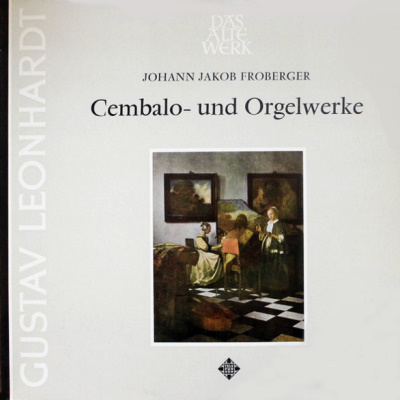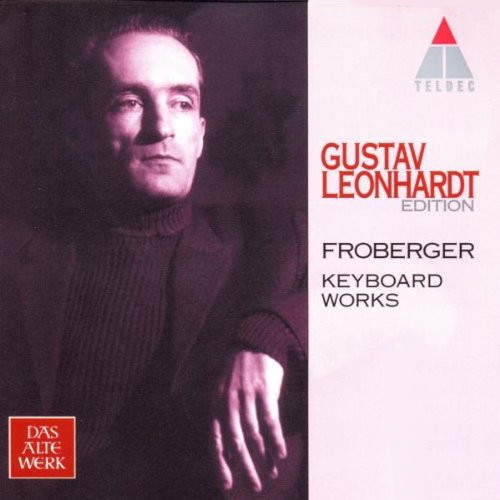 |
|
1 LP -
SAWT 9569-B - (p) 1970
|
 |
| 1 CD -
3984-21762-2 - (c) 1998 |
|
| CEMBALO- UND
ORGELWEKE |
|
|
|
|
|
|
|
|
| Johann Jakob
FROBERGER (1616-1667) |
Capriccio
2 |
Orgel |
|
4' 45" |
A1 |
|
Fantasia
3 |
Orgel |
|
4' 45" |
A2 |
|
Toccata
per l'Elevazione 11
|
Orgel |
|
5' 46" |
A3
|
|
Ricercar
II |
Orgel |
|
3' 46" |
A4 |
|
Canzona 2 |
Orgel |
|
6' 30" |
A5 |
|
Toccata
9 |
Cembalo
(1)
|
|
2' 24" |
B1 |
|
Suite
XVIII |
Cembalo
(2) |
|
8' 00" |
B2 |
|
-
(Allemande · Gigue · Courante · Sarabande)
|
|
|
|
|
|
Toccata
18 |
Cembalo
(1) |
|
3' 08" |
B3 |
|
Suite
12 - Lamento sopra la dolorosa
perdita della Real Maesta di Ferdinando
IV Rè de Romani etc. |
Cembalo
(2) |
|
9' 27" |
B4 |
|
-
(Gigue · Courante · Sarabande) |
|
|
|
|
|
|
|
|
|
|
Gustav
LEONHARDT
- Orgel: Christiaan-Müller-Orgel der
Waalse-Kerk in Amsterdam, 1773
- Cembalo (1): Cembalo italienischer
Bauart, 1manualig von Martin Skowroneck,
Bremen (1961)
- Cembalo (2): Cembalo flämischer
Bauart, 1manualig von Martin Skowroneck,
Bremen (1969)
|
|
|
|
|
Luogo
e data di registrazione |
|
Hervormde Kerk,
Bennebroek (Holland) - Febbraio
1970
|
|
|
Registrazione: live
/ studio |
|
studio |
|
|
Producer |
|
Wolf Erichson
|
|
|
Prima Edizione LP |
|
Telefunken "Das Alte
Werk" | SAWT 9569-B | 1 LP -
durata 50' 36" | (p) 1970 | ANA
|
|
|
Edizione CD |
|
Teldec Classics
"Gustav Leonhardt Edition" | LC
6019 | 3984-21762-2 | 1 CD -
durata 50' 36" | (c) 1998
| ADD
|
|
|
Cover
|
|
"Das Konzert" von
Veermer van Delft (1632-1675)
|
|
|
Note |
|
-
|
|
|
|
|
Froberger's
influences can be recognized
not only in the works of
Händel and Johann sebastian
Bach, but also of Bach's
sons. That means quite a lot
for a period that lived far
more in its present than in
its past. Johann Jakob
Froberger was a member of a
Saxon family from Halle
although he was actually
born (1616) in Stuttgart
where his father was a court
conductor. Johann Jakob's
special gift was one of
synthesizing; thus he
succeeded in developing the
many separate styles of the
time into one concentrated
yet quite "European" manner
of composition that, in
turn, had an inspiring
effect both formally and
stylistically.
It may be hardly true, as
was assumed until just
recently, that he was the
father of the piano suite,
yet as a composer for the
piano he did write
direction-giving works for
the organ and the
harpsichord, works that in
their variety and vital
power of expression can
affect us directly even
today. In other words, they
are far from being of
interest to only the
historian desirous of
proving how Froberger
blended together influences
drawn chiefly from Italian
and French music, but also
taken later from English and
Dutch music hand, last but
not least, from the North
German school - however,
exciting such evidence may
be for the musicologist
since, after all, the role
ob being the most important
intermediary at the middle
of the seventeenth century
must be ascribed to
Froberger.
This fact is based on
Froberger's life and
development. While he was
still in Stuttgart (where
music at the court followed
Italian, English and French
models), he encountered a
cosmopolitan-oriented
mentality. He continued his
studies in Vienna, was
active as organist, and
finally received a grant to
spend a period in Rome where
his studies with Frescobaldi
were to provide him with the
most lasting influences for
his subsequent composition.
When Froberger returned to
Vienna in 1641, he was
engaged by the court as a
fulltime organist.
Four years later, however,
Froberger took to the road
again - he worked in several
European cities, took part
in a famous contest in
Dresden, then 1653, returned
from Brussels and london,
via Paris, to spend four
more years in Vienna where
chamber music for
entertainment of the court
was added to his duties as
organist. Upon the death of
King Ferdinand IV (1654)
Froberger wrote his Suite
No. 12 as a lamento of firm
character. He retained the
French suite style with
respect to the sequence of
the movements which thus in
this case read Gigue -
Courante - Sarabande. In his
other suites - and these are
counted among his chief
works - he sometimes
preceded the gigue with an
allemande, but always
concluded with the
sarabande.
His predilection for
variations was also given
broad ground in his
French-styled suites in
which he incorporated
partially Italian and
partially German elements of
his won. In the toccatas we
also sense new compositional
means of transition that
clearly distinguish
Froberger's form
combinations from those of
Frescobaldi, as found for
example in the early type of
toccata alla leviatione.
Froberger developed the
stricter counterpoint of the
two - even to the point of
almost completely regular
fugues. Even today is still
is fascinating to notice how
the conflict between
Frescobaldi's largesse and
North German parsimony in
questions of form assumed
its own independent mold in
Froberger's music and
explains to some extent
Froberger's very great fame
and reputation in his day.
When he was thirty-five
years old, he was a
well-known figure, both as a
composer and as a brilliant
virtuoso, in all of the
musical centers in Europe.
When Froberger was ill and
had learned of his impending
early death, he sought
refuge with Duchess Sibylla
of Württemberg. His
conversion to catholicism
while a young man in Rome
had made him highly devout.
It seems that the duchess
was the only person close to
Froberger at the time since
he had never married and no
longer had any living
relatives. The duchess had
to promise Froberger that
she would "give no one
nothing" i his works "since
many did not know how to
handle them, but would
simply ruin them."
When Froberger died if
apoplexy at Héricourt near
Mentbéliard in 1667, there
remained few of his scores
for posterity, hardly any
vocal music, no works for
instrumental ensembles. The
compositions that we known
cannot even be dated
precisely. The first group
of works, capriccios and
ricercari, probably belongs
to the period after 1658; th
first fantasias and canzonas
may have been written before
1649. Still, everything that
has come down to us gives
evidence of an ingenious
sense of combination, as
well as of an elementary
abolity to create music with
expressive harmony, firmly
set rhythms, with almost
folk-like melodies and - in
the constructive sense -
charming augmentation or
diminution of themes in
ricercari and fantasias. It
is not without reason that
Froberger's influence upon
even the works of Bach and
Händel cannot be denied,
for, at the middle of the
seventeenth century, he was
an acknowledged and
important musician and
composer.
Wolf-Eberhard
von Lewinski
|
  |
|
|